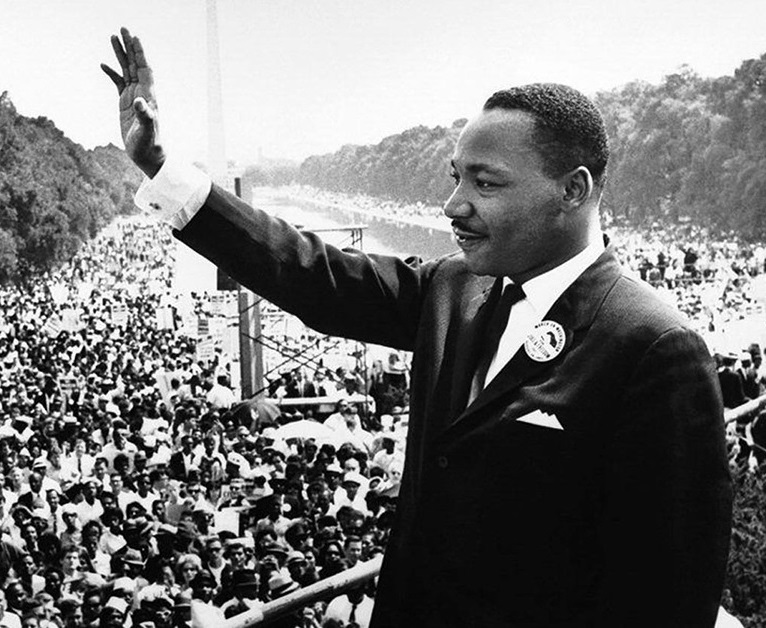Raising a King
Martin Luther King, Jr.’s early experiences shaped his life’s work to eradicate racial and economic injustice.
“A good name is to be chosen rather than great riches,
Loving favor rather than silver and gold.”
-Proverbs 22:1
His name was originally Michael — Michael Luther King, Jr. The name was passed down from his namesake father and mother, Alberta, at birth in January 1929. A mere five years later, the family embarked on a tour of Europe as part of the Baptist World Alliance, traveling to places meaningful to Christians — places like Rome, Jerusalem, and Bethlehem.
Their travels also took them through Germany at a time fraught with tension. While there, the family visited sites associated with Martin Luther, the German priest and theologian who led the Protestant Reformation in the 1500s.
The elder Kings watched in horror as the Christian values Luther displayed were set aside during the rise of Nazism in the mid-1930s. The Baptist World Alliance, with which the family remained affiliated, ultimately condemned the growth of antisemitism and oppression, and the Kings returned from Europe to their hometown of Atlanta.
Upon their return, Michael King, Sr. decided to honor Martin Luther’s work by changing both his and his son’s first names to Martin. It wasn’t until 1957, however – the year King, Jr. turned 18 – that his official birth certificate was changed to Martin.
Those early experiences shaped King, Jr. In his book, “The Autobiography of Martin Luther King, Jr.,” he credited his parents with instilling him with Christian values and a “strong determination for justice.”1
As a 15-year-old student in Atlanta, Martin, Jr. unofficially launched his speaking career when he delivered a talk titled “The Negro and the Constitution” in an oratory contest. One can see the foundation of his later work in the early speech:
“We cannot have an enlightened democracy with one great group living in ignorance … We cannot have a nation orderly and sound with one group so ground down and thwarted that it is almost forced into unsocial attitudes and crime. We cannot be truly Christian people so long as we flout the central teachings of Jesus: brotherly love and the Golden Rule. We cannot come to full prosperity with one great group so ill-delayed that it cannot buy goods … So as we gird ourselves to defend democracy from foreign attack, let us see to it that increasingly at home we give fair play and free opportunity for all people.”
-Martin Luther King, Jr., “The Negro and the Constitution,” 1944
To King, Jr., racial injustice and economic injustice were indelibly linked. While he had come from a financially stable home, many of his peers grew up in poverty and financial struggle. He knew change would only occur if Black Americans spoke out against the injustice. He felt it was his duty and calling from an early age:
“My father is a preacher, my grandfather was a preacher, my great-grandfather was a preacher, my only brother is a preacher, my daddy’s brother is a preacher. So I didn’t have much choice.”
-Martin Luther King, Jr., “The Autobiography of Martin Luther King, Jr.”
The desire to eradicate the wealth gap underpinned many of King, Jr.’s teachings, including his 1963 “I Have a Dream” speech. His words have been described as a “rallying cry,” but the original intent for the speech was to usher in an end to economic inequality for all people:
“When the architects of our Republic wrote the magnificent words of the Constitution and the Declaration of Independence, they were signing a promissory note to which every American was to fall heir … Instead of honoring this sacred obligation, America has given the Negro people a bad check, a check which has come back marked ‘insufficient funds.’ But we refuse to believe that the bank of justice is bankrupt.”
-Martin Luther King, Jr., “I Have a Dream”
Over the next five years, King, Jr. would continue speaking out against the racial wealth gap. Tragically, his life would end before he saw his dream of economic equality come to pass – one that we are still working toward as a country.
Much has changed in the world since Michael King, Jr. became Martin Luther King, Jr. in the early 1930s. It’s been 57 years since King, Jr. died, but his call to reduce racial and economic injustice remains. As Christians, we can heed this call – and honor his legacy – through careful stewardship and generous giving. After all, one of life’s true riches is the ability to serve others. In King’s own words:
“Life’s most persistent and urgent question is, ‘What are you doing for others?’”
-Martin Luther King, Jr., 1957
Related Reading:
- Making Change Through Love
- A Passion for Service
- Remembering Martin Luther King, Jr., and his brother, A.D. King
- Quiet Heroes of the Civil Rights Movement
1https://kinginstitute.stanford.edu/publications/autobiography-martin-luther-king-jr/chapter-1-early-years. Chapter 1: Early Years
CAS00001112-01-25
